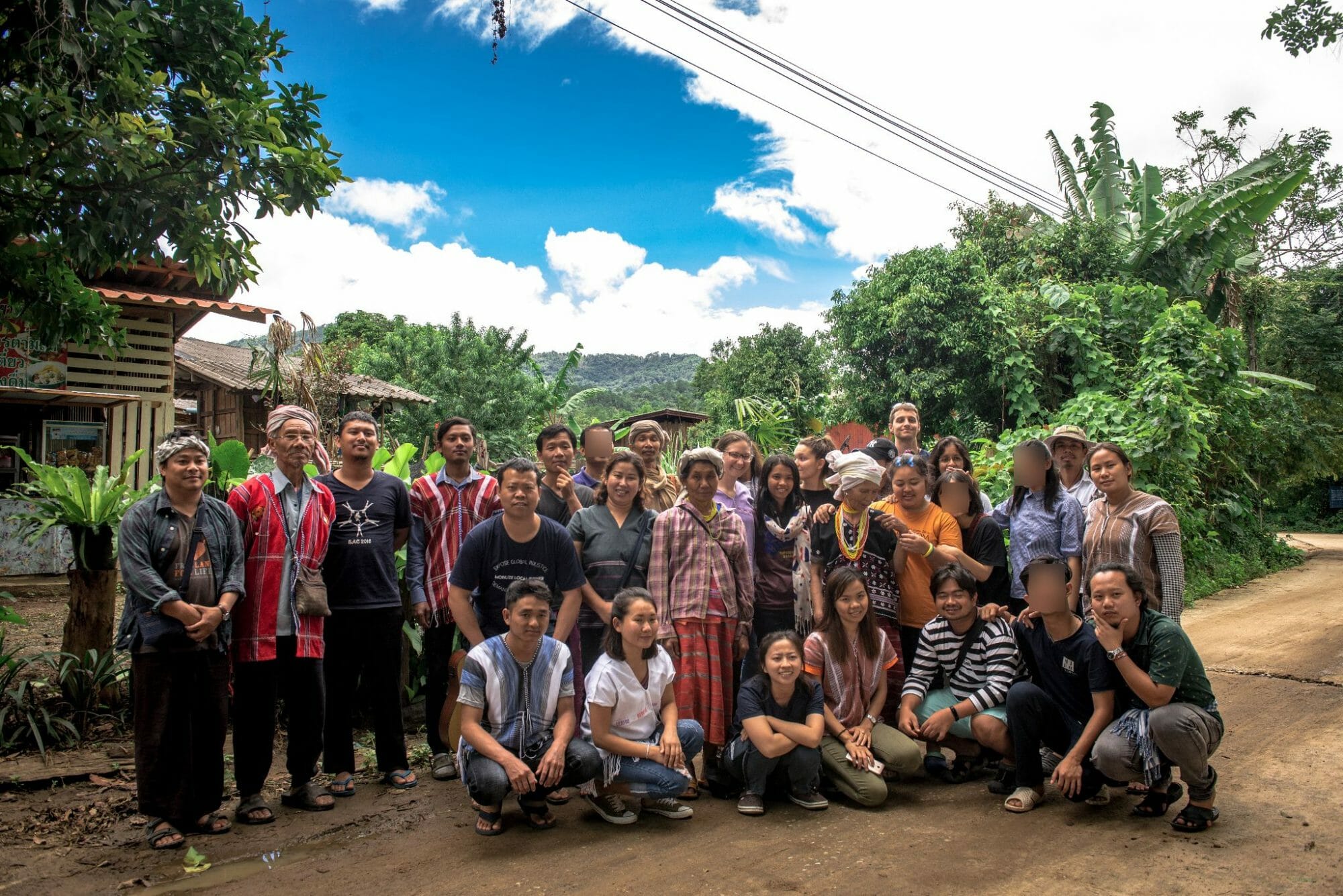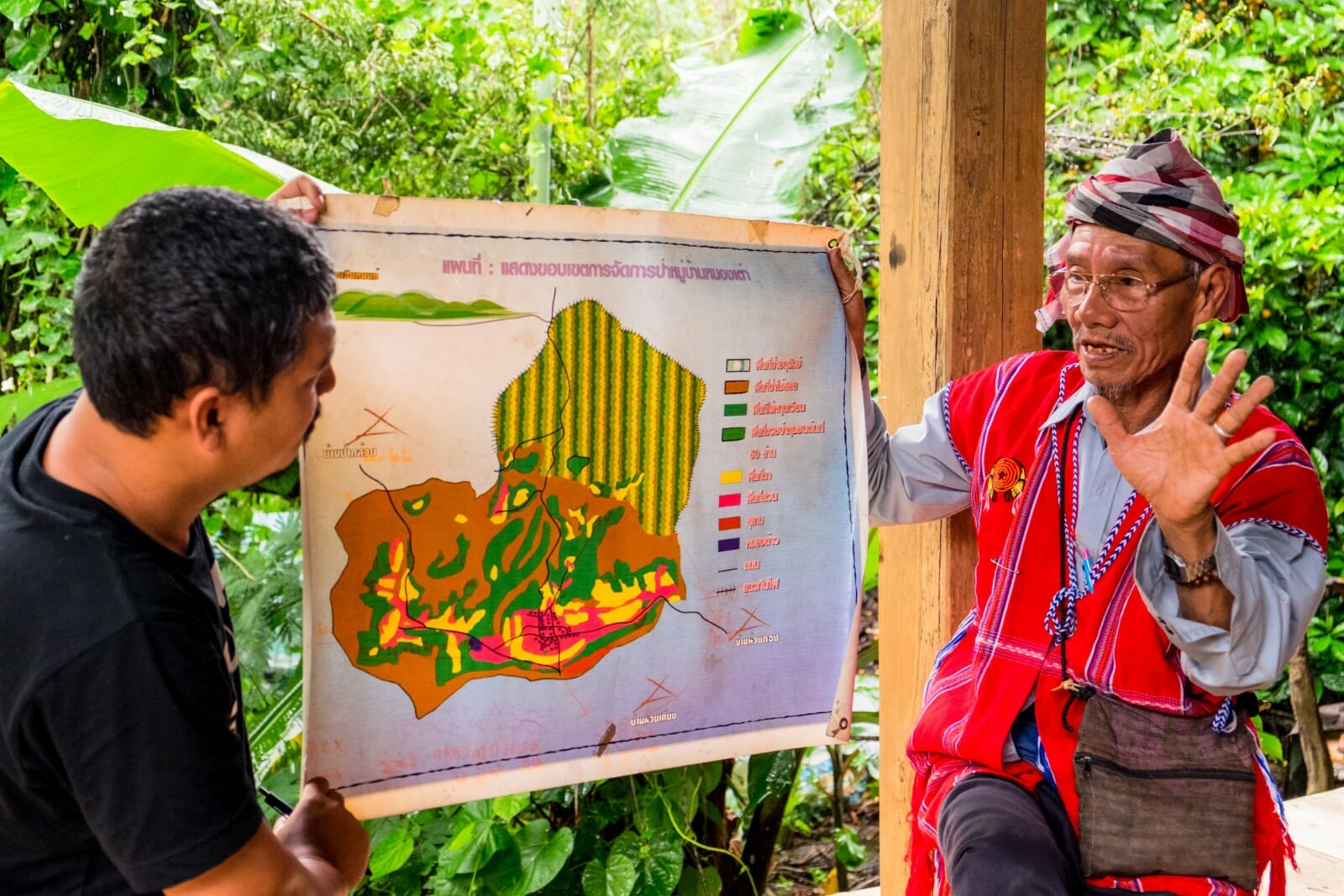It’s almost 10 PM in a forest in northern Thailand, and fifteen EarthRights School students are gathered under a single light, listening intently to Prue Odochao’s stories.
Prue is a climate justice and land rights activist. He once walked 700 kilometers from Chiang Mai province to Bangkok, to raise awareness about the culture and customs of indigenous communities like his and their struggles for their rights. He wore through four pairs of sandals on the walk.
The EarthRight School students are visiting Prue and his family at their home in an indigenous Karen community in Chiang Mai called Ban Nong Tao – a group of villages high in the mountains, in the forests above two national parks. In 2005, efforts to expand the conservation areas threatened to force the Ban Nong Tao community out of the forests they rely on for food, medicine, and housing. There are still laws in the books that criminalize integral parts of the customs of Prue’s community – from simply living in protected forest areas, to practicing traditional agriculture.
“One problem is the smoke in Chiang Mai every year. In spring, the government doesn’t allow us to burn anything. But our livelihoods depend on burning the grass and plants to prepare for rice planting,” said Prue. “We can’t plant rice like before because we can’t clear the land in time. Many communities have no support for their livelihoods.”

EarthRights School students learned from Karen climate justice and indigenous rights activists on a recent trip to the Ban Nong Tao community in northern Thailand.
Prue felt he had little choice but to organize the power of his community and speak out. Along with 50 other Karen, he made the march to Bangkok, collecting signatures to support a new community forest bill along the way – a bill that would allow communities like his to continue their traditional, environmentally sustainable practices.
“The bill got 50,000 signatures from people all over the country. The bill was later rejected by the government yet it marked an amazing collective effort of the community,” said Trang*, an EarthRights School student from Vietnam, after the trip. “Ever since, the fight to assert their rights to land and rights to manage the forest has never stopped.”
The Karen Struggle for Climate Justice
As Thailand has begun working to mitigate the effects of climate change, one of the country’s main strategies has been to expand forest conservation areas. The same laws continue to force indigenous communities out of their homes and the forests they rely on. The villagers maintain that their livelihoods and lifestyle are a part of the solution to mitigate climate change, not the problem.

As Thailand works to mitigate carbon emissions, new forest conservation and land laws threaten to push the Ban Nong Tao communities off of their land.
“They found support from an academic to do the research to compare the CO2 emissions from urban Thai communities to those from Karen people, to prove that their lifestyles produce less greenhouse gas than people living in cities and that their rotational agriculture still can absorb CO2,” said Thu*, an EarthRights School student from Vietnam, on the field visit.
The Ban Nong Tao community say they’re already seeing impacts that may come from climate change.
“One of the problems we have seen is lack of water resources. We used to have much natural water around here, and now we don’t. We have to buy and use a new PVC system for drinking water,” said Prue. “Farmers are now using chemicals to deal with new diseases, dirtying our environment and water supplies. Some are also forced to buy GMO seeds.”

EarthRights School student Jamon Sonpednarin in the rice fields of the Ban Nong Tao community.
“If we drink water we need to take care of the river”
Prue kept spreading his message. In 2009, Prue traveled to the UN Climate Change conference in Copenhagen (COP 15). He’s committed to spreading a new way to talk about climate change, focused on the vital role that indigenous knowledge must play in a sustainable future.
“The local people’s practice is different from, or even contradictory, to the mainstream development,” said Dung Pham Van, an EarthRights School student from Vietnam, after talking with Prue’s family. “Different species create different layers of shade for humans and other creatures. This arrangement also mitigates heavy rain and prevents flooding and landslides, while keeping humidity and helping to lessen drought.”
None of this is by accident.
“If we drink water we need to take care of the river. If we take soil we need to take care of the earth. If we eat frog we need to take care of the creek. If we eat fish we need to take care of water,” said Prue’s father, Jorni Odochao.
Jorni and his family are working to show younger generations how their subsistence lifestyle is both sustainable and provides a better quality of life. Jorni has planted over 80 types of tree on less than an acre of land.
“The new generation needs to rethink how to solve conflicts. We have to realize there are two kinds value in the world: the kind of value that comes from money and the value that comes from the natural world,” said Jorni.

A member of the younger generation of the Ban Nong Tao community (photo by EarthRights School student Jamon Sonpednarin).
Thu*, who grew up in a city in Vietnam, thought this was the strongest lesson that the activists of Ban Nong Tao had to offer: “The purpose of this trip was to learn about the culture and traditions of the local people – how they protect their land and how they advocate for their land rights as a minority group. But after this trip, I definitely could say that I have learnt more than this. The experiences that I got from this trip have changed my mind about the ethnic minorities living in the forest, their beauty, their beliefs, and how they can be resilient to protect their culture, traditions and especially their natural environment.”
*These EarthRights School students have changed their names for security reasons.






